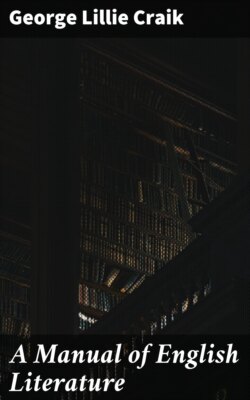A Manual of English Literature

Реклама. ООО «ЛитРес», ИНН: 7719571260.
Оглавление
George Lillie Craik. A Manual of English Literature
A Manual of English Literature
Table of Contents
I
II
III
IV
SPECIMENS
MANUAL OF THE HISTORY. OF. ENGLISH LITERATURE
INTRODUCTORY
The Languages of Modern Europe
Early Latin Literature in Britain
The Celtic Languages and Literatures
Decay of the Earliest English Scholarship
The English Language
Original English:—commonly called SAXON, or ANGLO-SAXON
The Norman Conquest
Arabic and other New Learning
Schools and Universities
Rise of the Scholastic Philosophy
Classical Learning.—Mathematics.—Medicine.—Law.—Books
The Latin Language
Latin Chroniclers
The French Language in England
The Langue d’Oc and the Langue d’Oyl
Vernacular Language and Literature:—a.d. 1066-1216
The Thirteenth and Fourteenth Centuries.—Ascendancy. of the Scholastic Philosophy
Mathematical and other Studies
Universities and Colleges
Cultivation and Employment of the Learned Tongues in the. Thirteenth and Fourteenth Centuries
Last Age of the French Language in England
Re-emergence of the English as a Literary Tongue
Second English:— commonly called SEMI-SAXON
The Brut of Layamon
The Ormulum
The Ancren Riwle
Early English Metrical Romances
Metrical Chronicle of Robert of Gloucester
Robert Mannyng, or De Brunne
Lawrence Minot
Alliterative Verse.—Piers Ploughman
PIERS PLOUGHMAN’S CREED
THIRD ENGLISH
(Mixed or Compound English.)
GEOFFREY CHAUCER
John Gower
Barbour
Compound English Prose.—Mandevil; Trevisa; Wiclif; Chaucer
Printing in England.—Caxton
English Chroniclers
Bishop Pecock; Fortescue; Malory
English Poets.—Occleve; Lydgate
Scottish Poets.—Wynton; James I.; Henryson; Holland; Blind Henry
Prose Writers:—More; Elyot; Tyndal; Cranmer; Latimer
Scottish Prose Writers
English Poets:—Hawes; Barklay
Skelton
Roy; John Heywood
Scottish Poets:—Gawin Douglas; Dunbar; Lyndsay
Surrey; Wyatt
THE ELIZABETHAN LITERATURE
The Mirror for Magistrates
Origin of the Regular Drama
Interludes of John Heywood
Udall’s Ralph Roister Doister
Gammer Gurton’s Needle
Misogonus
Chronicle Histories:—Bale’s Kynge Johan; etc
Tragedy of Gorboduc.—Blank Verse
Other Early Dramas
Second Stage of the Regular Drama:—Peele; Greene
Marlow
Lyly; Kyd; Lodge
Earlier Elizabethan Prose:—Lyly; Sidney; Spenser; Nash; etc
Edmund Spenser
Other Elizabethan Poetry
Warner
Daniel
Drayton
Joseph Hall
Sylvester
Chapman’s Homer
Harington; Fairfax; Fanshawe
Drummond
Davies
Donne
Shakespeare’s Minor Poems
Shakespeare’s Dramatic Works
Dramatists contemporary with Shakespeare
Beaumont and Fletcher
Jonson
Massinger; Ford
Later Elizabethan Prose Writers
Translation of the Bible
Theological Writers:—Bishop Andrews; Donne; Hall; Hooker
Bacon
Burton
Historical Writers
MIDDLE AND LATTER PART OF THE SEVENTEENTH CENTURY
Shirley, and the End of the Old Drama
Giles Fletcher; Phineas Fletcher
Other Religious Poets:—Quarles; Herbert; Herrick; Crashaw
Cartwright; Randolph; Corbet
Poets of the French School:—Carew; Lovelace; Suckling
Denham
Cleveland
Wither
Browne
Prose Writers:—Charles I
Milton’s Prose Works
Hales; Chillingworth
Jeremy Taylor
Fuller
Sir Thomas Browne
Sir James Harrington
Newspapers
Retrospect of the Commonwealth Literature
Poetry of Milton
Cowley
Butler
Waller
Marvel
Other Minor Poets
Dryden
Dramatists
Prose Writers:—Clarendon
Hobbes
Nevile
Other Prose Writers:—Cudworth, More; Barrow; Bunyan; &c
ENGLISH LITERATURE SINCE THE REVOLUTION OF 1688
First Effects of the Revolution on our Literature
Surviving Writers of the preceding Period
Bishop Burnet
Thomas Burnet
Other Theological Writers:—Tillotson; South
Locke
Swift
Pope
Addison and Steele
Shaftesbury; Mandeville
Gay; Arbuthnot; Atterbury
Prior; Parnell
Bolingbroke
Garth; Blackmore
Defoe
Dramatic Writers
Minor Poets
Collins; Shenstone; Gray
Young; Thomson
Armstrong; Akenside; Wilkie; Glover
Scottish Poetry
The Novelists, Richardson, Fielding, Smollett
Sterne
Goldsmith
Churchill
Falconer; Beattie; Mason
The Wartons; Percy; Chatterton; Macpherson
Dramatic Writers
Female Writers
Periodical Essayists
Political Writing.—Wilkes; Junius
Johnson
Burke
Metaphysical and Ethical Writers
Historical Writers:—Hume; Robertson; Gibbon
Political Economy; Theology; Criticism and Belles Lettres
THE LATTER PART OF THE EIGHTEENTH CENTURY
Cowper
Darwin
Burns
THE NINETEENTH CENTURY
THE LAST AGE OF THE GEORGES
Wordsworth
Coleridge
Southey
Scott
Crabbe; Campbell; Moore
Byron
Shelley
Keats
Hunt
THE FANCY CONCERT
Other Poetical Writers of the Earlier Part of the Nineteenth Century
Prose Literature
Progress of Science
LITERATURE OF THE PRESENT DAY
INDEX
Footnote
THE END
Отрывок из книги
George Lillie Craik
Published by Good Press, 2021
.....
And to the overthrow thus brought about of the native civilization was added, in the present case, the intrusion of another system of social organization, and of another language possessing also its own literature, to take the place of what was passing away. So that here again were two distinct forces harmoniously, though by movements in opposite directions, co-operating to a common end. At the same time that English culture shrunk and faded, Norman culture flourished and advanced. And the two forces were not balanced or in any way connected, but quite independent the one of the other. English culture went down, not under the disastrous influence of the rival light, but from the failure of its own natural aliment, or because the social structure of which it was the product had been smitten with universal disorganization. It was the withering of life throughout the whole frame that made the eye dim.
The difference, then, between the case of England conquered by the Normans in the eleventh century and that of Italy overrun by the Goths in the fifth, was twofold. First, the Normans did not settle in England, as the barbarous nations of the North did in Italy and other provinces of the subjugated Western empire; but, secondly, on the other hand, the new power which the Norman invasion and conquest of England established in the country was not a barbarism, but another civilization in most respects at least as advanced as the indigenous one;—if younger, only therefore the stronger and more aspiring, and yet, as it proved, not differing so far from that with which it was brought into competition as to be incapable of coalescing with it, if need were, as well as, in other circumstances, with its advantages of position, outshining it or casting it into the shade.
.....